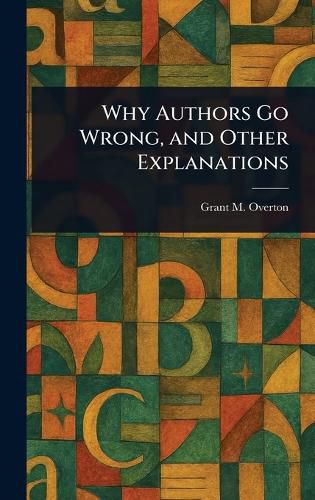Readings Newsletter
Become a Readings Member to make your shopping experience even easier.
Sign in or sign up for free!
You’re not far away from qualifying for FREE standard shipping within Australia
You’ve qualified for FREE standard shipping within Australia
The cart is loading…






This title is printed to order. This book may have been self-published. If so, we cannot guarantee the quality of the content. In the main most books will have gone through the editing process however some may not. We therefore suggest that you be aware of this before ordering this book. If in doubt check either the author or publisher’s details as we are unable to accept any returns unless they are faulty. Please contact us if you have any questions.
"Why Authors Go Wrong: And Other Explanations" by Grant Martin Overton offers insightful literary criticism and practical writing advice for aspiring authors and avid readers alike. Delving into the nuances of authorship, Overton examines common pitfalls and explores the importance of writing style and authorial intent.
This timeless work, meticulously prepared for print republication, provides a fascinating look at the craft of writing, offering explanations for when authors miss the mark. Whether you're seeking guidance on your own writing journey or simply interested in understanding the creative process, this book provides a valuable resource. Explore the considerations of authorship through Overton's insightful observations, gaining a deeper understanding of both successful and unsuccessful writing techniques. This is a classic study useful for both authors and those studying the language arts.
This work has been selected by scholars as being culturally important, and is part of the knowledge base of civilization as we know it.
This work is in the public domain in the United States of America, and possibly other nations. Within the United States, you may freely copy and distribute this work, as no entity (individual or corporate) has a copyright on the body of the work.
Scholars believe, and we concur, that this work is important enough to be preserved, reproduced, and made generally available to the public. We appreciate your support of the preservation process, and thank you for being an important part of keeping this knowledge alive and relevant.
$9.00 standard shipping within Australia
FREE standard shipping within Australia for orders over $100.00
Express & International shipping calculated at checkout
This title is printed to order. This book may have been self-published. If so, we cannot guarantee the quality of the content. In the main most books will have gone through the editing process however some may not. We therefore suggest that you be aware of this before ordering this book. If in doubt check either the author or publisher’s details as we are unable to accept any returns unless they are faulty. Please contact us if you have any questions.
"Why Authors Go Wrong: And Other Explanations" by Grant Martin Overton offers insightful literary criticism and practical writing advice for aspiring authors and avid readers alike. Delving into the nuances of authorship, Overton examines common pitfalls and explores the importance of writing style and authorial intent.
This timeless work, meticulously prepared for print republication, provides a fascinating look at the craft of writing, offering explanations for when authors miss the mark. Whether you're seeking guidance on your own writing journey or simply interested in understanding the creative process, this book provides a valuable resource. Explore the considerations of authorship through Overton's insightful observations, gaining a deeper understanding of both successful and unsuccessful writing techniques. This is a classic study useful for both authors and those studying the language arts.
This work has been selected by scholars as being culturally important, and is part of the knowledge base of civilization as we know it.
This work is in the public domain in the United States of America, and possibly other nations. Within the United States, you may freely copy and distribute this work, as no entity (individual or corporate) has a copyright on the body of the work.
Scholars believe, and we concur, that this work is important enough to be preserved, reproduced, and made generally available to the public. We appreciate your support of the preservation process, and thank you for being an important part of keeping this knowledge alive and relevant.